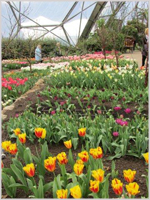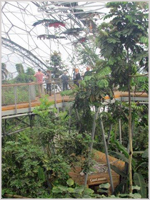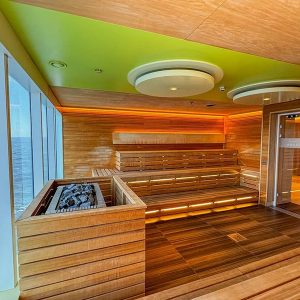 No matter how many pictures you’ve seen of the Eden Project’s bubble-like conservatories, nothing prepares you for seeing this outstanding Cornish tourist attraction in real life. But you do need to be patient. Opened in 2001 in a former china clay pit, the Eden Project is hidden from view as you approach from St Austell and wind downhill to the car parks.
No matter how many pictures you’ve seen of the Eden Project’s bubble-like conservatories, nothing prepares you for seeing this outstanding Cornish tourist attraction in real life. But you do need to be patient. Opened in 2001 in a former china clay pit, the Eden Project is hidden from view as you approach from St Austell and wind downhill to the car parks.
Only when you pass through the spacious Visitor Centre and step out onto the viewing platform do you catch your first glimpse of the world’s largest conservatories – two separate buildings, each composed of three domes resembling giant bubble wrap. It’s an unforgettable moment.
Eden Project is a temple to regeneration and sustainability, a global garden showcasing wild landscapes, ornamental plants, and a variety of the many crops that we rely on every day, from cotton to coffee, rubber to rice. Eden Project makes visitors of all ages think about the planet they live on and how best to manage it for the future. And it’s a great day out.
There’s a strong educational element here with many activities and exhibits aimed at young people and families, so what does the attraction offer to Silver Travellers and in particular those with accessibility issues?
 I checked out the Accessibility section of the Eden Project’s comprehensive website before visiting and it sounded impressive. The attraction won the Readers’ Choice category at the Rough Guide to Accessible Britain Awards in 2010, and it isn’t hard to see why.
I checked out the Accessibility section of the Eden Project’s comprehensive website before visiting and it sounded impressive. The attraction won the Readers’ Choice category at the Rough Guide to Accessible Britain Awards in 2010, and it isn’t hard to see why.
Free shuttle buses run from the car parks to the Visitor Centre, where there’s an accessible toilet opposite the main entrance. Further disabled toilets can be found in the Link building between the indoor biomes. Throughout the day, a free land train takes visitors to the base of the pit, and for those who prefer to walk through the Outdoor Biome but don’t want to tackle the steps, there’s an Easy Access Route suitable for wheelchairs that zig-zags down from the top terrace. And to get back up again, there’s a lift from the Core discovery centre.
In fact, the brains behind the Eden Project seem to have thought of everything. People with mobility or sensory impairments can even pre-book the services of an access volunteer to assist them round the project – the service is free but must be reserved at least two weeks in advance. Assistance dogs are welcome; carers are admitted free; and wheelchairs are also available to borrow. The site is packed with natural sensory experiences – textures and smells, sounds and tastes – but there are lots of added extras. Full details from www.edenproject.com/access-guide.
We visited mid-week in March during term time, when most visitors were adults, apart from a few British and French school groups, which made for a generally calm, relaxed experience. The spring flowers were in full bloom, but plantings change with the seasons, so there is always something to delight and inspire amateur gardeners.
 But however lovely the outdoor gardens, everyone wants to see inside the two massive conservatories.
But however lovely the outdoor gardens, everyone wants to see inside the two massive conservatories.
The Rainforest Biome features plants from the humid tropics, so is, by definition, steamy in atmosphere. The air temperature is a constant 25ºC, the humidity 75º, but you can leave your coat in the cloakroom at the entrance and chill out in the Cool Room beneath the rainforest canopy if necessary. Latest addition is an aerial walkway, accessible to both buggies and wheelchairs, and offering a unique perspective on this tropical paradise.
The Mediterranean Biome, by contrast, replicates a climate of hot, dry summers and warm, wet winters, with spring tulips, vines, olive trees and a host of other seasonal plants. A new café was under construction inside the biome during our visit, so summer visitors will even be able to recreate that Mediterranean holiday atmosphere.
It definitely pays to arrive early at the indoor biomes or visit in low season, as visitors follow a prescribed route through the conservatories, which could become congested at peak periods. You won’t want to miss the explanatory panels and displays along the way that reveal, for instance, that an area of primary forest the size of the Rainforest Biome is lost every 10 seconds. Sobering stuff.
 The main restaurant area is on the ground floor of the Link building. This can get a tad noisy at lunch time though if you happen to hit the school parties, so we opted for the quieter option of the Visitor Centre café. A further café on the top floor of the Core was closed during our spring visit. All Eden’s food outlets offer vegetarian, vegan and gluten-free options and do not knowingly include GM ingredients in any of the food.
The main restaurant area is on the ground floor of the Link building. This can get a tad noisy at lunch time though if you happen to hit the school parties, so we opted for the quieter option of the Visitor Centre café. A further café on the top floor of the Core was closed during our spring visit. All Eden’s food outlets offer vegetarian, vegan and gluten-free options and do not knowingly include GM ingredients in any of the food.
Our last stop was the extensive shop which stocks an impressive selection of ethically sourced gifts at affordable prices, including jewellery made by African communities; colourful jute shopping bags; candles made from rapeseed oil; T-shirts; and some lovely items in recycled glass.
But the ultimate gift for the friend who has everything has to be the range of attractive notepads embossed with elephant designs and made from … deep breath now … elephant poo. A conversation-stopper whoever you give it to!
For more information visit www.edenproject.com











